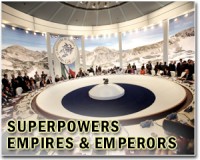 |
Tokyo (AFP) Sept 28, 2010 Japan stuck to its guns Tuesday in a row with China over a disputed island chain but also said it was open to high-level talks to defuse the worst spat in years between the Asian powers. Prime Minister Naoto Kan now plans to attend an Asia-Europe Meeting (ASEM) in Brussels next week, officials said, making clear that he would be open to talks with Chinese counterpart Wen Jiabao on the sidelines. Asia's two biggest economies have argued bitterly for three weeks over Japan's arrest of a Chinese skipper whose boat collided with two Japanese coastguard boats near the islands in the East China Sea. Japan has repeatedly urged rebuilding ties with its top trade partner, including a possible premiers' meeting at the ASEM summit. "If the conditions are right, the foreign ministry and others will try to set it up," said Kan's right-hand man, Chief Cabinet Secretary Yoshito Sengoku. But Kan later told reporters that, despite his hopes of meeting Wen at the ASEM summit, "I don't have a plan at this stage". Although the tone remained tense on both sides Tuesday, Beijing also signalled an interest in mending the badly frayed ties. "China highly values China-Japan relations," said foreign ministry spokeswoman Jiang Yu. "But safeguarding bilateral relations requires the two sides to meet halfway and requires Japan to take candid and practical actions. "Japan should take concrete steps to eliminate the negative impact of this incident on bilateral relations," Jiang told reporters. She urged Tokyo to "stop its stalking or disruption of Chinese fisheries law enforcement management boats" patrolling the disputed waters, but offered no other specifics on what steps should be taken. The boats have been watching each other in recent days near the disputed islands, known as Senkaku in Japan and Diaoyu in China. When asked about the prospects of a meeting between their premiers in Brussels, Jiang replied: "I have no information on that." ASEM groups the 27-nation European Union, the 10-member Association of Southeast Asian Nations (ASEAN), as well as China, Japan, South Korea, India, Pakistan and Mongolia. In the dispute between Asia's traditional rivals, China has repeatedly condemned the skipper's arrest as invalid and illegal, arguing that the islands have been part of China since ancient times. Japan released the captain last week, but the dispute has simmered on, with China demanding an apology, taking other punitive steps, and continuing to hold four Japanese nationals accused of filming a military installation. Japan's Foreign Minister Seiji Maehara Tuesday reiterated Tokyo's stance that it owns the islands and that "no territorial issue exists". He added that Japan was right to arrest the skipper for his "malicious act". Industry sources say China has also halted exports to Japan of rare earth minerals crucial for many high-tech products, slowed trade by stepping up customs inspections of Japanese goods, and discouraged tourism to Japan. The dispute and Beijing's hardball diplomacy have been watched by other nations that have territorial disputes with China, including Vietnam, which claims several contested islands in the South China Sea. "I am aware that the ASEAN nations also have had maritime disputes for decades," Sengoku said. "It would be ideal to solve such issues peacefully through multilateral and bilateral meetings." The row has also stoked anger in Japan, where criticism has been directed against the centre-left government for giving in to Chinese pressure and releasing the captain, a decision officially made by prosecutors. The assembly of Japan's far-southern island of Okinawa unanimously adopted a resolution Tuesday to protest China's "intrusion" into Japan's territorial waters near the islands, local officials said. But several cabinet ministers called for reconciliation. Trade Minister Banri Kaieda said: "China's de facto ban on exports of rare earth minerals to Japan could have a grave impact on Japan's economy." And Defence Minister Toshimi Kitazawa said: "We have to deal with the issue carefully to avoid relations deteriorating further." burs-kh/apj
Share This Article With Planet Earth
Related Links Learn about the Superpowers of the 21st Century at SpaceWar.com Learn about nuclear weapons doctrine and defense at SpaceWar.com
 China warns Nobel committee over dissident
China warns Nobel committee over dissidentOslo (AFP) Sept 28, 2010 China has warned the Norwegian Nobel committee against awarding the Nobel Peace Prize to a Chinese dissident, the Nobel Institute's director said Tuesday. Geir Lundestad, who is also the secretary of the Nobel committee, said he received the warning when he met China's Vice Foreign Minister Fu Ying in June. Jailed activist Liu Xiaobo is seen as a favorite for the peace prize this year. ... read more |
|
| The content herein, unless otherwise known to be public domain, are Copyright 1995-2010 - SpaceDaily. AFP and UPI Wire Stories are copyright Agence France-Presse and United Press International. ESA Portal Reports are copyright European Space Agency. All NASA sourced material is public domain. Additional copyrights may apply in whole or part to other bona fide parties. Advertising does not imply endorsement,agreement or approval of any opinions, statements or information provided by SpaceDaily on any Web page published or hosted by SpaceDaily. Privacy Statement |